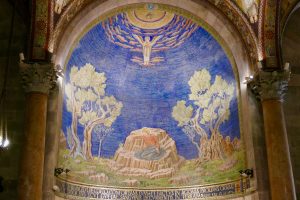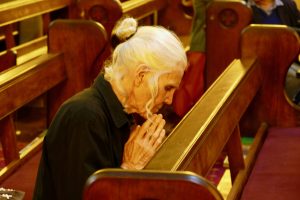HOMILY SUNDAY 17 – C
Lord, Teach Us to Pray
(Genesis 18:20-21, 23-32; Psalm 138; Col 2:6-14; Luke 11:1-13)
*************************************************************
Liturgists who choose the readings for each Sunday try to arrange a connection between the Gospel and the first reading. The second reading may also have an obvious connection, but that usually is secondary.
Today’s readings fit that pattern exactly. The theme of prayer dominates both the Gospel and the first reading from Genesis. Paul in the second reading to the Corinthians takes us into a whole new direction, yet in a way that does connect with the other readings.
Ultimately, we are encouraged to pray, and to pray with faithful persistence.

Agony in the garden, Church of All Nations, Mt of Olives
What is striking in the Gospel is the fact that it is Jesus who is at prayer. Jesus himself spent hours in prayer, communing with the Father, and as such set an example for us. If Jesus could spend time in prayer, his disciples should spend time in prayer. It is that simple. And it is that rootedness in the Father’s love through prayer that gave Jesus the strength he needed to accomplish the mission that he had been given by the Father – the mission that is the focus of the second reading, his passion on the Cross.
It is fitting that as Jesus modeled prayer for the disciples, they responded by asking him to teach them how to pray. The prayer that Jesus taught them is striking in its simplicity and yet marvelous in its depth. It begins with praising God and ends with the petitions for the grace we need to be his disciples.
Over and above that, in this gospel we see Jesus teaching the disciples, and us, that persistence is an important element of prayer. We are not to allow ourselves to be discouraged by lack of results, but to continue to present our needs and the needs of the world before the Father.
We are taught to search before we knock and ask. The best place we can search is within the Word of God, and there we are told that there is ultimately only one thing that we really need to ask for, and that is the Holy Spirit. That is the one good thing that the Father wants to give us, and will most certainly give to us if we but ask and open ourselves to receiving that Spirit.
In the first reading, we are given an example of persistence in prayer as Abraham seems to wear God down with his persistent pleading that God spare the cities of Sodom and Gomorrah if only ten just men would be found there. Abraham had the same insight into prayer that Jesus taught his disciples in the Gospel – persistence in praying.
Paul in the second reading, underlines it was prayer that gave Jesus the strength to accomplish his mission here on earth. Here we see that mission concisely summed up in a few sentences. Through the Cross, Jesus forgave us all our sins, set us free from the constraints of the Law, and revealed the depth of the Father’s love for all humanity. Through our baptism into Jesus Christ, we are buried with him and rise to a new life in Him. That too, is prayer at its best, for it is a living out of our relationship with Jesus in daily life.
Ron Rolheiser, Oblate theologian and well-known spiritual writer, has this to say about persistent prayer: “We cannot always control how we feel about things. We cannot always control how we will be tempted. And none of us has the strength to never fall into sin. Our incapacity to fully actualize ourselves morally leaves us always short of full sanctity. There are things beyond us.
 But there is something that we can control, something beyond the wild horses of emotion and temptation. We are beset by many things, but we can willfully, deliberately, with discipline and resolve, show up regularly to pray. We can make private prayer a regular discipline in our lives. We can commit ourselves to the habit of private prayer. And if we do that, irrespective of the fact that we will have to work through long periods of dryness and boredom, eventually what that prayer brings into our lives will weed out our bad habits, rationalization and sins. Two contraries cannot co-exist inside the same subject.
But there is something that we can control, something beyond the wild horses of emotion and temptation. We are beset by many things, but we can willfully, deliberately, with discipline and resolve, show up regularly to pray. We can make private prayer a regular discipline in our lives. We can commit ourselves to the habit of private prayer. And if we do that, irrespective of the fact that we will have to work through long periods of dryness and boredom, eventually what that prayer brings into our lives will weed out our bad habits, rationalization and sins. Two contraries cannot co-exist inside the same subject.
Eventually we will either stop praying or we will give up our sin and rationalization. Nobody can be praying genuinely on a regular basis and be blind to his or her own sinfulness.”
The Eucharist is our greatest prayer as a church. And the center of that prayer is the Our Father is highlighted in today’s Gospel. May our celebration help draw us closer to God each day in our times of prayer. And may we live out our prayer by serving our brothers and sisters in the world.




Well thanks for the inspiring homily and reflections about learning how to pray and reaching out for prayers is a way to deepen our faith. Praying all the time or during the day can help us communicate with the Lord Father and son. If we pray morning and evening he will protect us from any harm and danger coming our way. He will hear our prayers if we have any intentions throughout the day. The most important prayer is the Our Father or contemplative prayer because it describes who is Jesus Christ and how he completed his father’s mission. So, this prayer is recited during celebrations and masses because the Passover meal and Eucharist represents Jesus ‘ flesh and blood . While we receive the Eucharist; Jesus is present within us and we are to pray or communicate with him during this private moment. We are to live out our prayer by helping other people who are struggling or who have not recognize the Lord God. Amen. Amen. Praise to you Lord Jesus Christ.
Thanks again for the beautiful message and teachings Bishop Sylvain Lavoie ✌?️??✝???❤️???. Gracias! Merci!